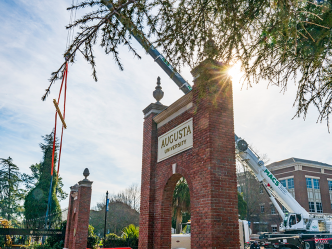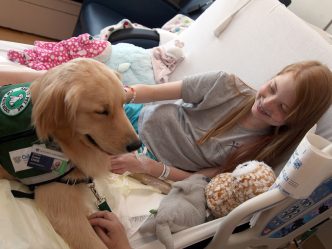After months and months of strenuous, coordinated effort, we’re close to the finish line when it comes to our accreditation.
The Southern Association of Colleges and Schools Commission on Colleges’ (SACSCOC) on-site team will be vising Augusta University March 22-24, marking the final phase of this long process.
Basically, this team, which is made up of a group of our peers from other institutions, each with special knowledge about specific aspects of university operations, will be conducting a review of what we’ve already submitted regarding our affirmation documents, while giving special attention to the second part of our accreditation process, our Quality Enhancement Plan (QEP).
Because we had so few findings from the off-site review – only nine findings were even of concern, which is relatively few compared to the average number of findings from the off-site review staff – we expect the visit to focus mostly on the QEP, which is called Learning by Doing: Discover, Engage, Reflect, Lead.
Learning by Doing will integrate experiential learning into our educational programs and will offer a Leadership Certificate for undergraduates. Students will be able to earn the embedded certificate by taking a newly established leadership course and QEP-designated courses within their majors, then completing a hands-on capstone project involving undergraduate research or scholarship, internship or study away. The Leadership Certificate will not only become a part of their official transcript, but it will also arm them with vital skills and experiences to prepare them for their professions or graduate school.
It’s important to know that although the site team hasn’t yet made their recommendation, we are nevertheless moving full speed ahead to implement this program. We have space identified for the offices, and we are in the process of hiring a director. Frankly, that kind of preparation is what the site team expects to see, and we’ve had our own team of people working hard to make sure we have a comprehensive program in place for them to evaluate. They want to see that there is a substantial and real institutional commitment to it, and there is. We are moving forward with the assumption that they’re going to love it.
Not only will the site team be vising both the Summerville and Health Sciences campuses, because this is an affirmation rather than a re-affirmation (this is our first post-consolidation accreditation), they will also be spending time at some of our distant campuses. Just prior to their Augusta visit, they will be stopping at the MCG clinical campuses in Savannah. A team will also visit our campus in Athens, which will allow them to visit both the College of Nursing there as well as the partnership medical campus.
Because so many of our faculty and staff are so deeply involved in their programmatic accreditations, it’s sometimes easy to overlook this overall evaluation of our campus, which occurs on a 10-year cycle. While those programmatic accreditations are obviously vital to the continued operation of each college and they serve as a foundation for a strong academic structure, none of those really matter if the university itself is not accredited, which is why we’ve spent so much time and effort making sure we’re fully prepared.
This has been a long, but valuable, process, and it’s important to note that we haven’t had extra people devoted solely to this. This work has been added onto the already full workloads of many people across the university. The upside to that is the fact that the principles and standards the site team wants to witness are the things we should be doing anyway, and the process itself has brought us a long way toward incorporating those things into the fabric of how we continue to assess and improve our educational programs. And those strategies and practices will continue beyond preparing for the microscopic scrutiny of our evaluation.
As for the urban legend that the on-site team will randomly ask people on campus if they know about the QEP, let’s just say that it can’t hurt for everyone to be prepared to field such a question, so spread the word. Though I’ve served as an on-site visitor and have never been party to such a thing, it is certainly always a possibility.
In closing, I want to express my appreciation to all those people who devoted countless hours toward preparing for this visit. As I am constantly reminded, we have an amazing group of talented and committed individuals who consistently go above and beyond. Our students and our university are very fortunate to have such dedicated people, and I consider myself fortunate to be a part of it.
 Augusta University
Augusta University



